2. The Church Fathers and Ongoing Persecution
| Key Dates # |
|
|---|
| 130 | Death of Papias, an early Christian leader in Hierapolis (in modern Turkey)
|
| 130 | Conversion of Justin Martyr, one of the first great apologists of the church
|
| 144 | Expulsion of Marcion for false teaching
|
| 150 | Birth of Clement of Alexandria
|
| 155 | Martyrdom of Polycarp, an early church leader
|
| 156 | Birth of the Montanists
|
| 160 | Birth of Tertullian
|
| 161 | Marcus Aurelius becomes Emperor - increased persecution of Christians
|
| 165 | death of Justin Martyr
|
| 167 | Christianity declared a crime against the state in Asia Minor
|
| 180 | End of Marcus Aurelius' reign
|
| 185 | Birth of Origen
|
| 192 | Death of brutal/corrupt Emperor Commodus (of Gladiator fame, 2000)
|
| 202 | Septimus Severus renews persecution of the church for refusing his pagan religion
reforms
|
| 202 | Irenaeus is martyred
|
| 216 | Birth of Mani, the founder of Manichaeism, a fusion of Persian, Christian and
Buddhist teachings
|
| 225 | Death of Tertullian
|
| 245 | Conversion of Cyprian, who becomes Bishop of Carthage in 247
|
| 249-251 | Reign of Decius - renewed persecution of Christians
|
| 254 | Death of Origen
|
| 258 | Martyrdom of Cyprian
|
| 284 | Persecution by Diocletian commences
|
Overview
Half a century earlier, the Apostle Paul had written: "a great door for effective work has opened
to me, and there are many who oppose me" (1 Corinthians 16:9). The second and third
centuries of the Christian era are marked by ongoing evangelism and church planting, a steadily
growing number of Christians in different communities, traditions and social classes across the
entire empire, needing organisation and sound, godly leadership, in the absence of an agreed
New Testament and common creed, facing political, economic and social issues establishing and
regulating a common Christian community while persecution continues.
The term church "fathers" refers to influential Christian leaders (teachers, theologians, whose
works are sometimes called "patristic") who were essentially the next wave after the Apostles
(who discipled many of them, according to tradition) and those who ministered alongside them.
This period saw the emergence of a number of serious heresies and exponential growth.
This lesson identifies the main leaders (sometimes called "apologists"#) and concludes with a
discussion of ongoing persecution of the church.
# So-called, not because they apologised for the Christian faith, but because what they wrote (often addressed to political leaders,
such as emperors, the Senate, or educated groups of citizens, was designed to explain and defend the faith (a reasoning faith, in the
face of misunderstanding and slander) as preferred to paganism, answer the accusations of their opponents, appeal to the broader
population and use such an approach, including intellectual argument, to win more people to Christ.
Some Influential Christians During the Second and Third Centuries
Polycarp of Smyrna (69-155AD)
Polycarp was a Christian Bishop of Smyrna, now Izmir (Turkey). He had been a disciple of the
Apostle John. He quoted first century Apostles in his writings and teaching. He died at the
stake. Legend has it that the flames built to kill him refused to do so, so he was stabbed to
death by the superstitious Romans; so much blood flowed from his body that the flames were
extinguished.
"Sixty and eight years have I served Him, and He has done me nothing but good; and how
could I revile Him, my Lord and Saviour." (Polycarp, on his arrest)
Irenaeus of Gaul
Bishop of what is now Lyons, in France. An early Christian writer who sought to systematize
Christian theology. A disciple of Polycarp. In 180- he wrote a book entitled "Against Heresies".
He proposed that the only way for the Christian community to be united and stand against false
doctrine was to set up episcopal councils (led by bishops). It was Irenaeus who first proposed
that Matthew, Mark, Luke and John be accepted as canonical and was one of the first Christian
leaders to cite all 27 books in his writings. It is easy to focus on particular teachings of
individual Christian leaders (and where they differed from our patterns of orthodoxy), but it
must be remembered that the early church did not have an agreed New Testament as such to
draw on, which made it all the more important for what was believed (cf "those who walk by
this rule") to be codified quickly.
Clement of Alexandria
A distinguished teacher in Alexandria; this says something, given that Alexandria was a cultural
centre established by Alexander the Great and was one of the main centres of scholarship in the
early Christian era. He headed up a Christian school teaching those preparing for baptism
(indicating baptism had moved into a more formal tradition than it was in the first century, and
was seen as linked to becoming a Christian). He drew on Greek philosophy and linked them to
Christian traditions and doctrines. Some historians believe that he ended up with a Christian
Platonism. Others insist that he was simply using methodologies to interpret and apply
Christianity (in the absence of an Introduction to Theology course or denominational creeds).
His writings sound syncretistic.
Justin Martyr (100-165)
Born in Nablus. After studying various Greek philosophies he embraced Christianity. Justin was
inspired by the examples of early Christians who were suffering and dying for their faith. He set
up a teaching school in Rome, but his teaching became syncretistic (mixing pagan philosophy and
religion with the Christian message). Martyr taught that the "logos" (as seeds of truth, not a
person) is to be found in all religions, but that only Christianity had the complete truth. He was
eventually denounced by his enemies, scourged and beheaded.
Origen of Alexandria
Son of an early Christian martyr, a scholar and well known early theologian in Alexandria. He
updated the Jewish Septuagint and wrote commentaries.
Origen drew on Greek philosophy and tried to harmonise it with Christianity. For example
(following Plotinus) he taught that the soul passes through successive stages before incarnation
as a human and after death, eventually reaching God. He taught that God was not
Jehovah/Yahweh but a First Principle, and that Christ, the Logos, was subordinate to him.
Origen had a hierarchical view of the Trinity and emphasised the ascetic life.
Origen was exiled from the church a number of years, relocated to Palestine, was imprisoned for
his faith and died not long after being released from prison in 254AD.
Tertullian (160-225)
 The son of a Roman centurion, born in Carthage. He was a trained lawyer, a writer of
apologetic, theological and ascetic works. He became very influential and was eventually
recognised as the Father of the Latin Church (Alexandria was a predominantly Latin city.). He
eventually based himself in Rome, where he practised as a lawyer. He is said to have introduced
the term "Trinity" into Christian vocabulary. He objected to Justin Martyr's use of pagan
philosophy to defend the Christian message; one of his maxims was "What has Athens to do with
Jerusalem?"
The son of a Roman centurion, born in Carthage. He was a trained lawyer, a writer of
apologetic, theological and ascetic works. He became very influential and was eventually
recognised as the Father of the Latin Church (Alexandria was a predominantly Latin city.). He
eventually based himself in Rome, where he practised as a lawyer. He is said to have introduced
the term "Trinity" into Christian vocabulary. He objected to Justin Martyr's use of pagan
philosophy to defend the Christian message; one of his maxims was "What has Athens to do with
Jerusalem?"
But as a trained lawyer Tertullian became well-known for ably defending the Christian message
in a pagan community, and against Gnosticism. Tertullian is one of the first Christian leaders
who spoke of a New Testament and accorded it similar weight as the existing Old Testament.
However, he also emphasised Christian tradition as equal to the Scriptures if it was consistent
with Scriptural teaching. (Some denominations continue to give equal weight to tradition as
they do the Scriptures.) He also taught that goods works could complement grace as a way of
salvation.
Tertullian eventually embraced the teachings of the Montanists and fell out of favour with other
church leaders.
Cyprian of Carthage (died 258)
Cyprian was a prominent man in the city of Carthage, who became a Christian in 246AD after
listening to the testimony of a church elder. He later became a Bishop and was a prolific writer.
He had orthodox views about salvation, the Lord's Supper (initially his interpretation was
correct, however he later came to see the Lord's Supper as a fresh sacrifice of the actual body
and blood of Christ, on each occasion, which led in later centuries to the doctrine of
transubstantiation) and the role of the church in demonstrating Christian charity in a non-
Christian world.
Cyprian was a centrist in terms of church government and the authority of bishops (and the
apostolic succession), using Old Testament models of ordinances and sacrifices as models for the
church. Died as a martyr by being beheaded 65 kilometres from Carthage.
The individuals mentioned above are only a small sample of (better known) church
leaders/influencers in the 2nd and 3rd centuries. Some Christian denominations are tempted to
elevate them (and Christians of note) as "saints", to whom prayers may be addressed and who
are believed to be able to bring about events/results in the life of the church on earth. Such
teaching is not Biblical.
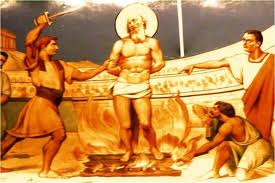
Death of Ploycarp
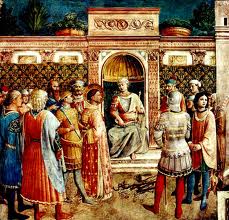
Trial of Justin Martyr
Formulation of the Canon of the New Testament
"Now, brothers and sisters, I want to remind you of the gospel I preached to you, which you
received and on which you have taken your stand. By this gospel you are saved, if you hold
firmly to the word I preached to you. Otherwise, you have believed in vain. For what I received
I passed on to you as of first importance: that Christ died for our sins according to the
Scriptures, that he was buried, that he was raised on the third day according to the Scriptures,
and that he appeared to Cephas, and then to the Twelve. After that, he appeared to more than
five hundred of the brothers and sisters at the same time, most of whom are still living, though
some have fallen asleep. Then he appeared to James, then to all the apostles, and last of all he
appeared to me also, as to one abnormally born." (1 Corinthians 15:1-7)
Christians believe that the New Testament is part of the revealed inspired Word of God. The 27
books brought together over a period of more than 100 years and took into account:
- oral tradition
- consistency with historical facts known to the early church
- consistence with earliest known Bible writings/revelation
- acceptance by church leaders
- availability of early manuscripts of texts eventually included in the NT
- ratification by various church councils
Montanism
Originated in 156, names after Montanus, its founder. Montanus came to believe that he was the
personal incarnation of the Paraclete (John 14:16); he claimed to have received a series of
visions from the Holy Spirit; taught that Christians who fell from faith could not be restored.
Along with two women who accompanied him (Priscilla, and Maximilla) he had ecstatic visions
and utterances about end times and asserted that he was proclaiming the Word of God. The cult
split many Christian communities in the second and third centuries, including between those
who believed in continuing revelation and a coming Day of Judgement, and those who claimed
that revelations and visions during ecstatic experiences reminded them of pagan "oracles", and
that God's revelation and prophecy were now complete (a debate that continues to our day).
Marcionism
Marcion claimed that God's revelation was limited. He was anti-Jewish. He rejected the Old
Testament (and the leadership of Peter, James and John, who were committed to the Old
Testament) and most of the New testament, accepting only a cut-down version of Luke's Gospel
and ten of Paul's letters (but not the pastoral Epistles). He taught that Jesus only appeared to
be human. Marcion taught asceticism and purity of life, including water instead of wine for
communion; total celibacy (claiming that the command to be fruitful and multiply came from
the God of the Old Testament, whom he rejected (and whom he claimed was not the Father of
Jesus Christ); and enjoyment of food and wine as sinful. The simplicity of his teaching appealed
to many. Marcion was expelled from the church in 177 AD.
- One of the positive spin-offs of Marcion's teaching what that it encouraged other
Christian leaders to define which books they were prepared to accept and progressed
formulation of the NT cannon.
The Birth and Spread of Manichaeism
Manichaeism was a religious movement that had its origins in 3rd Century Persia. Its founder,
Mani (born in what is now Iraq), termed himself the "Apostle of Light". A mixture of Buddhism,
Zoroastrianism, Taoism and Christianity, it was a syncretistic religion in its own right. Mani
claimed that he was the latest in a long line of prophets that started with Adam. He claimed
that all previous religions were limited in some ways, in part because they were monocultural,
nationalistic or too local.
Mani believed his role was to replace all religions.
Manichaeism spread into the Roman Empire, where it took hold in some areas for considerable
periods, and a number of church fathers, including Augustine temporarily embraced it. It
established pockets in what are now France and Spain, emerging later in the teachings of the
Cathars and Albigensians (more about them later in the course). Mani taught that the way of
salvation was through a special "knowledge" of spiritual truth. He taught that this world is evil
and painful and that revelation of truth he espoused was the only way to salvation and true
spiritual freedom. Followers were expected to avoid over-involvement in physical or material
enjoyment, such as procreation, eating of meat, having possessions, drinking of wine and
harvesting or cultivation of crops. What mattered to Mani were prayer, almsgiving and fasting.
Communal life was celebrated with confession and singing of hymns.
Persecution of the Church Continues
"The blood of the martyrs is the seed of the Church." (Tertullian)
Jesus and the New Testament writers taught that Christians would be persecuted:
"Blessed are those who are persecuted because of righteousness, for theirs is the
kingdom of heaven. Blessed are you when people insult you, persecute you and falsely
say all kinds of evil against you because of me. Rejoice and be glad, because great is
your reward in heaven, for in the same way they persecuted the prophets who were
before you." (Matthew 5:10-12)
"If the world hates you, keep in mind that it hated me first. If you belonged to the
world, it would love you as its own. As it is, you do not belong to the world, but I have
chosen you out of the world. That is why the world hates you. Remember what I told
you: 'A servant is not greater than his master.' If they persecuted me, they will
persecute you also." (John 15:18-20)
"You, however, know all about my teaching, my way of life, my purpose, faith, patience,
love, endurance, persecutions, sufferings—what kinds of things happened to me in
Antioch, Iconium and Lystra, the persecutions I endured. Yet the Lord rescued me from
all of them. In fact, everyone who wants to live a godly life in Christ Jesus will be
persecuted, while evildoers and impostors will go from bad to worse, deceiving and being
deceived." (2 Timothy 3:10-13)
The first wave of persecution of Christians started with the stoning of Stephen in Jerusalem and
officially continued until 313AD, when Constantine signed the Edict of Milan; continued
sporadically at a local level for a number of years. (It might be argued that persecution really
started with the crucifixion of Jesus.) After this, the focus shifted to persecution of alleged
heretics within the church.
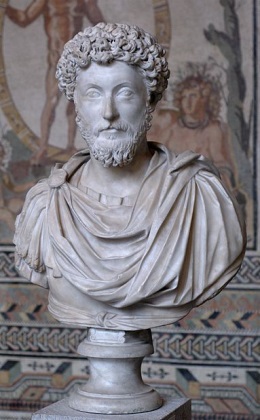
Marcus Aurelius
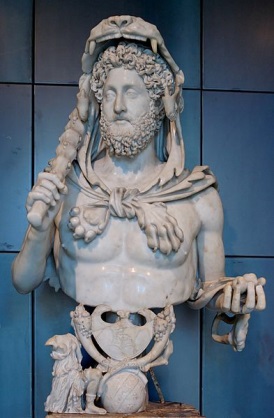
Commodus
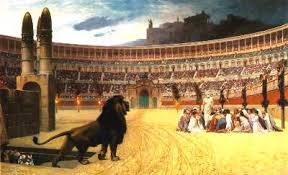
Depiction of Christians in the Colosseum
Reasons for Persecution of Christians:
- spiritual opposition
- Jewish leaders continuing opposition that flowed from the deaths of Stephen, James and
others; this continued in Hellenic cities (Acts 7:54-60; 9:23-25; 14:1-7; 18:12-17; 24:27)
- fear of the unknown, of new teachings
- Roman religion was polytheistic (centred around many gods, ceremonies and
sacrifices); many Romans thought that monotheism (without idols) was akin to
atheism; the Greek poet Hesiod wrote that there were as many as 30,000 gods, so
the absence of images in Christian communities made them curious, or even
hostile
- the Christian message (which was monotheistic) threatened all of that (Jews had
been exempted for political reasons);
- opponents feared they would be punished by their gods for allowing a new religion
to compete or to prevail; in 111AD Pliny the Younger, Governor of Bithynia wrote
to Trajan asking what to do with local Christians, there were so many of them that
pagan temples were being abandoned entirely; Christians were blamed for natural
disasters (including disease, famine, military defeats); Trajan confirmed that they
were to be executed; some historians believe those who persecuted Christians did
so to satisfy offended deities
- persecution of Christians was popular (and often officially encouraged/sanctioned at the
highest levels of government, including emperors; they were easy to pick, as the streets
of ancient cities were littered with gods and it was impossible for Christians to refuse to
offer sacrifices or incense or swear by the gods without being noticed; in addition to
personal danger facing individuals, meeting for Christian worship was forbidden and
Christian texts were destroyed.
- ethnic divisions; rejection of a "foreign" religion; persecuted as a Jewish sect; the Jews
were persecuted because of their rebellions against Rome and the political needs of the
Flavian emperors; the Romans did not initially distinguish between Christianity and
Judaism; once the two came to be recognised as distinct, Christian was targeted as a
"superstition" founded on the teachings of someone the Roman administration regarded
as an convicted criminal
- interests protecting religious and economic systems of their own; as Christians
penetrated every level of society, in every quarter of the empire, gaining in power,
prestige and materially they were bound to attract jealous opponents
- rulers jealous of Christian allegiance to Christ; rulers in Rome were often cult figures in
their own right (often at their insistence); refusal to honour Caesar as God amounted to
rebellion or treason
- rulers asserting the belief systems of the majority, for political, public security reasons;
opposed Christians disturbing the peace; Christians opposed war, violence, common
immoral practices
- In 202 AD Septimus Severus sought to unite Rome under one religion, the worship
of the Unconquered Sun (cf Akhenaton, who had done the same in Egypt); Jews
and Christians refused to join in and were therefore persecuted
- misunderstanding of Christian teaching, eg allegations of cannibalism in connection with
the Lord's Supper (this continued throughout the Middle Ages)
- negative views about Christian exclusivism, ie Christians would not join in
ceremonies/events worshipping pagan gods; this was seen as undermining social unity,
attracting the jealousy and anger of the gods who were not being neglected
- fear of Christian prophecies about coming judgement
- the need for scapegoats, eg Nero's persecution in 64AD because he needed people to
blame for the fire of Rome (which many historians believe he started, to enable him to
re-design Rome) and it was strategic and easy to blame the Christian community; after
all, they talked about a fiery end to the world
- martyrdom was seen by some Christian communities as a sign of their devotion to Christ.
What Forms Did Persecution Take?
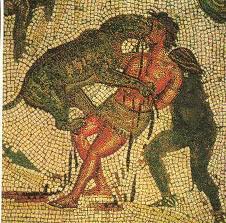 Christians (all social classes) were subject to violent suffering/death because of their testimony.
Christians (all social classes) were subject to violent suffering/death because of their testimony.
- beheading
- being thrown to wild beasts in places like the Colosseum
- being skinned alive
- being shot with arrows
- being beaten to death
- being boiled in oil
- being beaten to death with clubs
- being scourged
- being crucified
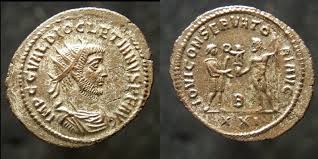
Diocletian
Many Christians also died during prolonged imprisonment.
Records from the early church tell of Christians who embraced martyrdom because they knew
this was the short step to the presence of Christ. The word "witness" comes from the Greek
word for martyr. There are many accounts of believers who reported extra strength from the
Holy Spirit as they faced persecution. Opposition spurred a generation of apologists who sought
to explain Christianity in a way that could be broadly understood. For latter generations it also
sparked a cult of Christian 'saints", the term being taken to mean "exceptional" Christians,
rather than ordinary believers as inferred in the New Testament.
What about those who renounced their faith?
The records of early Christianity show that believers facing execution were often called on to
renounce their faith, and to prove their return to true religion by sacrificing to the gods,
declaring their devotion orally; those who refused died; those who did so were often shunned by
the Christian community. Prolonged debates arose as to whether lapsed Christians could ever be
forgiven.
Lessons for us
Finally, there was always a risk that the growth of the church, the decay in power of the ancient
gods and less persecution would ultimately lead to lead to a drop-off in fervent faith on the part
of those who had until then been forced to choose for or against Christ in the face of suffering
and death, leading to lukewarmness and indifference. Christianity became a religion, not a faith
in Jesus Christ. False teaching and practice began to spring up.
One of these was the emergence of clericalism, rigid systems of clergy and hierarchies in the
Christian church; traditions from Judaism (eg about the priesthood) and governance of the
empire began to take hold in the organised church.
This led to a separation between ordinary Christians and priests, bishops and other church
offices, and the creation of the un-Biblical concept of "laos" ("laity"). The "priesthood of all
believers" was ultimately abandoned. Priests assumed roles as mediators between ordinary
Christians and God (cf 1 Timothy 2:5). The gifts of the Holy Spirit and ministry gifts described in
the epistles began to drop off and be replaced by forms and liturgies, ceremonial dress and titles
(eg Bishop, as the supreme authority in the church; less emphasis, if any, on the role of the Holy
Spirit). By 245 clergy received salaries as such and were discouraged from working for a living.
Bishops created new offices and ecclesiastical provinces that came to be known as dioceses.
Public buildings designed and designated for use by Christians (early church buildings) became to
emerge from the mid 3rd century in different parts of the empire. Baptism changed from total
immersion to sprinkling or pouring of water over the head. Non-Christians had often wondered
why Christians did not have temples or altars, however clerical traditions introduced
organisational elements that looked like pagan worship.
By the end of this period, Christianity was starting to be accepted as a legitimate religion.
Cyprian (in the West) and Origen (in the East) spoke of the secular spirit that was creeping into
the Christian community; of pride, materialism, luxury and covetousness of the clergy. Much of
the church history that followed showed the worldliness into which a church not led by Godly
men or the Holy Spirit could slip.
The same challenges exist today; Christians facing persecution know where they stand;
Christians in the West are often oblivious to the compromises they make and the
indifference into which they can easily fall.)
The miracle is that, in the face of this, the Holy Spirit kept alive men and women profoundly
committed to Jesus Christ and the Biblical way of salvation.
Additional Reading
Renwick, AM, The Story of the Church, Intervarsity Press, Edinburgh, 1973
A Lion Handbook, 1990, The History of Christianity, Lion
Miller, A, Miller's Church History: From the First to the Twentieth Century
Blainey, G, A Short History of Christianity, Viking, Melbourne, 2011
Sparkes, R, The Rise of Christianity: How the Obscure, Marginalised Jesus Movement Became
the Dominant Religious Force in the Western World in a Few Centuries
Sparkes, R, Cities of God: The Real Story of How Christianity Became an Urban Movement and
Conquered Rome, Harper One, New York, 2006
 The son of a Roman centurion, born in Carthage. He was a trained lawyer, a writer of
apologetic, theological and ascetic works. He became very influential and was eventually
recognised as the Father of the Latin Church (Alexandria was a predominantly Latin city.). He
eventually based himself in Rome, where he practised as a lawyer. He is said to have introduced
the term "Trinity" into Christian vocabulary. He objected to Justin Martyr's use of pagan
philosophy to defend the Christian message; one of his maxims was "What has Athens to do with
Jerusalem?"
The son of a Roman centurion, born in Carthage. He was a trained lawyer, a writer of
apologetic, theological and ascetic works. He became very influential and was eventually
recognised as the Father of the Latin Church (Alexandria was a predominantly Latin city.). He
eventually based himself in Rome, where he practised as a lawyer. He is said to have introduced
the term "Trinity" into Christian vocabulary. He objected to Justin Martyr's use of pagan
philosophy to defend the Christian message; one of his maxims was "What has Athens to do with
Jerusalem?"




 Christians (all social classes) were subject to violent suffering/death because of their testimony.
Christians (all social classes) were subject to violent suffering/death because of their testimony.
